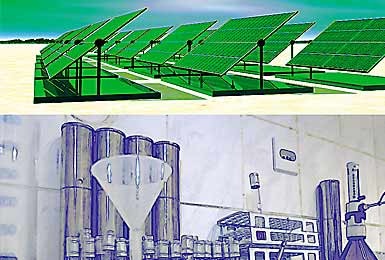Regional Report: The South's Automotives, Alternative Energy Sectors Ready to Grow
The alternative energy, automotive, and biosciences industries are helping the southern states retain economic stability and plan for future growth.
June/July 10

State Energy Programs
Southern states are growing green jobs by investing in State Energy Programs (SEPs) funded by the American Recovery and Reinvestment Act (ARRA). While the energy portion of the act grants $61.3 billion to dozens of initiatives, Brian Henderson, Southeast regional coordinator for the National Association of State Energy Officials (NASEO), says about $3.4 billion specifically funds state energy programs. Each state energy office's piece of the pie depended on grant proposals approved by the federal government.
"This is a huge opportunity for states to make a significant impact on expanding their energy efficiency bases," Henderson says. "They hope to get the [stimulus] funds out quickly. Some will use [the money] mostly for energy retrofit jobs. Others will focus more on economic development efforts to attract manufacturers of energy-related products."
NASEO's March 2010 State Energy Program ARRA Update highlighted regional success stories of SEP-financed projects.
• Louisiana: The Home Energy Rebate Option Program, established for consumers in 2000, will also include businesses. It offers a higher cash rebate of up to $3,000 to eligible parties upgrading to higher energy efficiency standards as they build, retrofit, or remodel structures. Total state SEP funding: $71.7 million.
• Tennessee: SEP funds will establish a comprehensive solar energy and economic development program focusing on job creation, education, renewable power production, and technology commercialization through two initiatives. The Tennessee Solar Institute at the University of Tennessee and Oak Ridge National Laboratory will help speed the use of solar photovoltaic technology and create a solar opportunity fund to give $23.5 million in grants to solar energy firms and companies installing solar systems. The 20-acre West Tennessee Solar Farm will be one of the largest such facilities in the South, and operate as a demonstration tool showcasing solar technologies. Total state SEP funding: $62.4 million.
• Alabama: The University of Alabama in Huntsville received $600,000 for the state's auto industry. The school could help up to 40 auto suppliers increase energy efficiency, reduce waste in their manufacturing processes, and retain up to 2,000 jobs. Total state SEP funding: $55.5 million.
• Kentucky: The Green Bank of Kentucky financing program, established with $14 million, makes public buildings energy-efficient and creates green jobs. A $1.3 million loan will save $2.15 million in energy costs for three buildings. Total state SEP funding: $52.5 million.
• Arkansas: Grants of $1.2 million to Pulaski Technical College and $1.3 million to NorthWest Arkansas Community College will provide training for up to 600 green energy jobs. Each college will establish a Building Training Center of Excellence to train energy industry workers. Total state SEP funding: $39 million.
• Mississippi: The $10 million Mississippi Job Protection through Energy Economic Development program funds energy efficiency retrofits and upgrades to cut costs, reduce energy consumption, and create or retain jobs for eligible businesses. Twenty-five firms have already received $21,000 to $450,000 in grants. Total state SEP funding: At least $13.4 million.
Momentum in Biosciences
In May the Washington, D.C.-based Biotechnology Industry Organization (BIO) published the Battelle/BIO State Bioscience Initiatives 2010 report. It contains the latest biotech data on national, state and metro employment and growth trends from 2001 to 2008. According to the report, academic bioscience R&D expenditures for Tennessee totaled $544 million in 2008; in Alabama, $512 million; in Louisiana, $442 million; in Kentucky, $379 million; in Mississippi, $191 million; and in Arkansas, $190 million.
Nationwide investment in bio projects is rising. While the South has "historically not been a hotbed of bio or life sciences activity," says Patrick Kelly, BIO's vice president of state government relations and alliance development, the region is supporting biosciences with added R&D and commercialization. But biotech isn't for every location. Some areas are focusing investment in other industries better suited to their economies.
Project Announcements
Apex Plastics Opens Expanded Production Plant In Brookfield, Missouri
09/22/2014
Japan-Based Bridgestone Rubber-BSA Opens Biorubber Process Research Center In Mesa, Arizona
09/22/2014
SpencerARL Expands Its Plattsburgh, New York, Manufacturing Facility
09/22/2014
Hill International, Inc. Relocates Corporate Headquarters To Philadelphia, Pennsylvania
09/22/2014
Prysmian Group Plans $8.2 Million Expansion At Abbeville County, South Carolina, Manufacturing Center
09/22/2014
Japan-Based Kowa Kentucky Plans $8.3 Million Manufacturing Facility In Corbin, Kentucky
09/22/2014
Most Read
-
Top States for Doing Business in 2024: A Continued Legacy of Excellence
Q3 2024
-
Data Centers in 2025: When Power Became the Gatekeeper
Q4 2025
-
Speed Built In—The Real Differentiator for 2026 Site Selection Projects
Q1 2026
-
Preparing for the Next USMCA Shake-Up
Q4 2025
-
The New Industrial Revolution in Biotech
Q4 2025
-
Strategic Industries at the Crossroads: Defense, Aerospace, and Maritime Enter 2026
Q1 2026
-
The Skilled Trades Are Ready for a Digital Future
Q4 2025


